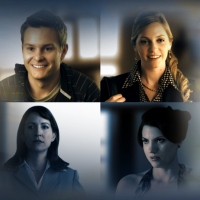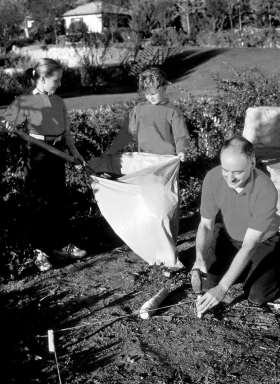Man, in his anxieties, is prone to
All one has to do is designate “people wearing black caps” as the villains and one can start a slaughter of people in black caps.
This characteristic makes it very easy for the Anti-Social Personality to bring about a chaotic or dangerous environment.
Man is not naturally brave or calm in his human state. And he is not necessarily villainous.
Even the Anti-Social Personality, in his warped way, is quite certain that he is acting for the best and commonly sees himself as the only good person around, doing all for the good of everyone—the only flaw in his reasoning being that if one kills everyone else, none are left to be protected from the imagined evils. His conduct in his environment and toward his fellows is the only method of detecting either the Anti-Social or the Social Personalities. Their motives for self are similar—self-preservation and survival. They simply go about achieving these in different ways.
Thus, as Man is naturally neither calm nor brave, anyone to some degree tends to be alert to dangerous persons and hence, witch hunts can begin.
It is therefore even more important to identify the Social Personality than the Anti-Social Personality. One then avoids “shooting” the innocent out of mere prejudice or dislike or because of some momentary misconduct.
The Social Personality can be defined most easily by comparison with his opposite, the Anti-Social Personality.
This differentiation is easily done and no test should ever be constructed which isolates only the Anti-Social. On the same test must appear the upper as well as lower ranges of Man’s actions.
A test that declares only Anti-Social Personalities without also being able to identify the Social Personality would be itself a suppressive test. It would be like answering “Yes” or “No” to the question “Do you still beat your wife?” Anyone who took it could be found guilty. While this mechanism might have suited the times of the Inquisition, it would not suit modern needs.
As the society runs, prospers and lives solely through the efforts of Social Personalities, one must know them as they, not the Anti-Social, are the worthwhile people. These are the people who must have rights and freedom. Attention is given to the Anti-Social solely to protect and assist the Social Personalities in the society.
All majority rules, civilizing intentions and even the human race will fail unless one can identify and
The frailty of showing how the harmful people can be known is that these then apply the characteristics to decent people to get them hunted down and eradicated.
The
Government is only dangerous when it can be employed by and for Anti-Social Personalities. The end result is the eradication of all Social Personalities and the resultant collapse of Egypt,
You will note in the characteristics of the Anti-Social Personality that intelligence is not a clue to the Anti-Social. They are bright or stupid or average. Thus those who are extremely intelligent can rise to considerable, even head-of-state heights.
Importance and ability or wish to rise above others are likewise not indexes to the Anti-Social. When they do become important or rise, they are, however, rather visible by the broad consequences of their acts. But they are as likely to be unimportant people or hold very lowly
Thus it is the twelve given characteristics alone which identify the Anti-Social Personality. And these same twelve, reversed, are the sole criteria of the Social Personality, if one wishes to be truthful about them.
The identification or labeling of an Anti-Social Personality cannot be done honestly and accurately unless one also, in the same examination of the person, reviews the positive side of his life.
All persons under stress can react with momentary flashes of anti-social conduct. This does not make them Anti-Social Personalities.
The true Anti-Social Person has a majority of anti-social characteristics.
The Social Personality has a majority of social characteristics.
Thus one must examine the good with the bad before one can truly label the Anti-Social or the Social.
In reviewing such matters, very broad testimony and evidence are best. One or two isolated instances determine nothing. One should search all twelve social and all twelve anti-social characteristics and decide on the basis of actual evidence, not opinion.
The twelve primary characteristics of the Social Personality are as follows:
1. The Social Personality is specific in relating circumstances. “Joe Jones said…” “The Star newspaper reported…” and gives sources of data where important or possible.
He may use the generality of “they” or “people,” but seldom in connection with attributing statements or opinions of an alarming nature.
2. The Social Personality is eager to relay good news and reluctant to relay bad.
He may not even bother to pass along criticism when it doesn’t matter.
He is more interested in making another feel liked or wanted than disliked by others and tends to err toward reassurance rather than toward criticism.
3. A Social Personality passes communication without much alteration and, if deleting anything, tends to delete injurious matters.
He does not like to hurt people’s feelings. He sometimes errs in holding back bad news or orders which seem critical or harsh.
4. Treatment and reform work very well on the Social Personality.
Whereas Anti-Social People sometimes promise to reform, they do not. Only the Social Personality can change or improve easily.
It is often enough to point out unwanted conduct to a Social Personality to completely alter it for the better.
Criminal codes and violent punishment are not needed to regulate Social Personalities.
5. The friends and associates of a Social Personality tend to be well, happy and of good morale.
A truly Social Personality quite often produces betterment in health or fortune by his mere presence on the scene.
At the very least he does not reduce the existing levels of health or morale in his associates.
When ill, the Social Personality heals or recovers in an expected manner, and is found open to successful treatment.
6. The Social Personality tends to select correct targets for correction. He fixes the tire that is flat rather than attack the windscreen. In the mechanical arts, he can therefore repair things and make them work.
7. Cycles-of-action begun are ordinarily completed by the Social Personality, if possible.
8. The Social Personality is ashamed of his misdeeds and reluctant to confess them. He takes responsibility for his errors.
9. The Social Personality supports constructive groups and tends to protest or resist destructive groups.
10. Destructive actions are protested by the Social Personality. He assists constructive or helpful actions.
11. The Social Personality helps others and actively resists acts which harm others.
12. Property is property of someone to the Social Personality and its theft or misuse is prevented or frowned upon.
The Basic Motivation
The Social Personality naturally operates
He is not haunted by imagined enemies, but he does recognize real enemies when they exist.
The Social Personality wants to survive and wants others to survive, whereas the Anti-Social Personality really and covertly wants others to succumb.
Basically the Social Personality wants others to be happy and do well, whereas the Anti-Social Personality is very clever in making others do very badly indeed.
A basic clue to the Social Personality is not really his successes, but his motivations. The Social Personality when successful is often a target for the Anti-Social and by this reason he may fail. But his intentions included others in his success, whereas the Anti-Social only appreciate the doom of others.
Unless we can detect the Social Personality and hold him safe from undue restraint and detect also the Anti-Social and restrain him, our society will go on suffering from insanity, criminality and war, and Man and civilization will not endure.
Of all our technical skills in Scientology, such differentiation ranks the highest since, failing, no other skill can continue as the base on which it operates, civilization, will not be here to continue it.
Do not smash the Social Personality—and do not fail to render powerless the Anti-Social in their efforts to harm the rest of us.
Just because a man rises above his fellows or takes an important post does not make him an Anti-Social Personality. Just because a man can control or dominate others does not make him an Anti-Social Personality.
It is his motives in doing so and the consequences of his acts which distinguish the Anti-Social from the Social.
Unless we realize and apply the true characteristics of the two types of personality, we will continue to live in a quandary of who our enemies are and, in doing so, victimize our friends.
All men have committed acts of violence or omission for which they could be censured. In all Mankind there is not one single perfect human being.
But there are those who try to do right and those who specialize in wrong and upon these facts and characteristics you can know them.
investigations carried out, supposedly to uncover and expose disloyalty, dishonesty or the like, usually based on doubtful or irrelevant evidence. From the witch hunts of Salem, Massachusetts, in 1692, which led to the execution of twenty people, based on little evidence, for allegedly practicing witchcraft.
block or obstruct, as to prevent someone’s plans from succeeding.
last act or manifestation of someone or something before dying, from the belief that the dying swan sings.
the capital of Babylonia, an ancient empire of southwest Asia (located in the area now called Iraq) which flourished ca. 2100–689
positions people hold in society or in an organization in terms of social standing or rank.
a reference to the optimum solution to any problem: that solution which brings the greatest benefits to the greatest number of dynamics. Such solutions lead to increased survival on the majority of the dynamics. See also dynamic in this glossary.

